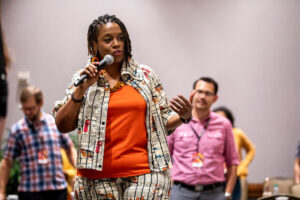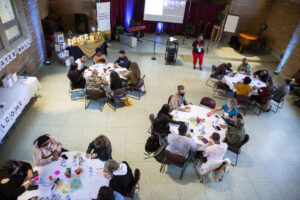In my role with the Forum for Theological Exploration (FTE), I create spiritually formative experiences for young leaders aged eighteen to thirty. Our gatherings create the conditions for participants to discern the next steps in their life journeys alongside unlikely suspects accompanied by transformative worship experiences.
I’ve come to call myself an architect of genuine engagement and sacred encounters. As I curate these spaces and see transformation occur among our constituency, I’ve wondered what it would be like to export some of these practices to the wider faith community?
FTE, an Atlanta-based non-profit, was founded in 1954 to cultivate leaders in the church and the academy. FTE’s contemporary mission is to be a leadership incubator that inspires young people, Christian innovators, and scholars of color to be change-makers at the intersections of church, community, and theological education. In 2013, FTE paused to reflect on our work. We identified that our work did not always reflect our values around diversity and access to resources. Our president, Stephen Lewis, invited us to ask difficult questions. Using social technologies and creative muses, we engaged in human-centered design practices taught by IDEO, a national leader in design thinking. A generative and creative approach to our work emerged. We disrupted what we were doing to forge a new future. The “secret sauce” of FTE’s convening design is the CARE practices.[1] The CARE practices invite thoughtful intention to our programs. They integrate our stated values with our convening methodology.
CARE is an acronym that stands for:
Create hospitable space,
Ask self-awakening questions,
Reflect theologically and critically together, and
Enact a next most faithful step
In 2020, FTE’s leadership fully explored the CARE practices in the book Another Way: Living and Leading Change on Purpose.[2] This teachable framework made our values and implementation easily accessible and adaptable. People who appreciate FTE’s commitment to dialogical pedagogy and participatory engagement could more readily access the knowledge and wisdom of our approach in this synthesis of practical theology, organizational theory, and design thinking.
In her book, Transforming Congregations through Community, practical theologian Boyung Lee offers a post-colonial vision for the mainline church’s future. She calls for a pedagogical reform, led by the belief that models of community can reform faith communities skewed by an emphasis on Western individualism.[3] Building on this concern, my project explores the possibilities for CARE-filled worship curation as a part of the pedagogical reform for which Lee advocates and as a promising method for sustained congregational vitality. Curating CARE-filled worship holds the potential to create congregational vitality in both online and in-person gatherings.
Virtual Application of the CARE Practices
During the pandemic, FTE moved all convenings online. The CARE framework, essential to our in-person gatherings, also helped us create a virtual container to hold a broad and diverse group of people, even with the multiple constraints of online gatherings. In advance, participants receive the Covenants of Presence, a set of agreements that create a safe-enough container for sharing vulnerability around life experiences. [4] The Covenants remind us of who we are called to serve and shape humane ways of showing up for one another in plenaries, small groups, and one-on-one encounters. They create a space of radical hospitality. After creating this hospitable container, we are able to lead people to ask self-awakening questions and reflect on where God is or who God desires us to be as a collective. Our concluding work never ends without an invitation to a “next most faithful step.”

Invite participants to bring their creature comforts to virtual experiences (journal, snacks, coffee, or tea).
The CARE framework guides us through intentional virtual worship and communal design in numerous ways. The imperative to C: Creating truly hospitable space meant that we: provided opportunities for participants to get to know each other gently, through virtual icebreakers; shortened the length of time of meetings to ward off Zoom fatigue; provided care boxes in advance with items reflecting embodied, contemplative, and meditative values. Inviting participants to light candles together, experience finger labyrinths together, and break bread with a Grubhub gift certificate all contributed to the feeling of journeying together. Deeper into our online gathering, we moved participants toward A: Asking Self Awakening Questions using an artistic muse as a spoken word artist. Their performance became the starting point of a facilitated conversation.
The CARE framework’s guidelines to R: Reflect Theologically and Critically Together meant that we approached the scripture of the Woman at the Well in ways that evoke the senses, asking:[5] How do we hear, see, smell, and touch the experience through the senses? I curated music and video performances to elevate the hearts and minds of our audience and bring them into reflection and critical theological thinking that included space for lament and prayer. Our participants were strangers to one another; nevertheless, they brought their vulnerability and engaged deeply with others. This left me wondering: what kind of power might these kinds of practices have in communities where individuals are familiar with each other?
The final move in our online worship experience was E: Enacting a next most faithful step. As we approached this moment, I acknowledged the social isolation people had been experiencing and named that we were now a gathered community. We engaged the holy by listening to the words of the late Senator John Lewis: getting into “good trouble” resonated with our social justice-oriented participants. We closed by peering into the unknown future, led by our sage, Dr. Elizabeth Conde Frazier, who encouraged our participants to find their voice and then engaged in a lively sermon talk-back. The conversation and the wisdom flowed.
In-person Application of the CARE Practices
Upon returning to in-person meetings, we faced the challenge of balancing our offerings with ample breaks for those holding the malaise of a global pandemic. Our meetings tend to be process-heavy, and our participants found reflection, at times, very overwhelming. So we:
- Set up generous breaks.
- Convene in spaces with beautiful surroundings, mountains, waterways, etc.
- Provide opportunities for guided self-care practice.
- Provide spaces that are conducive to reflection and journaling.
- Create small groups to build community.
- Provide counseling and spiritual direction professionals.
We had to discern the pulse of the gathering while also being prepared to pivot across a broad diversity of people, if necessary. Leveraging facilitation toolkits and leaning into deeper engagement with the pain points of participants proved to be most helpful. Slowing down—a key imperative of the CARE framework, provided a counter-cultural reminder of the importance of time in building relationships, allowing small groups to bond.
In an age of information overload and knowledge saturation, people desire hands-on learning in community. They want real solutions for their challenges that aid in discerning, analyzing problems, and creating meaningful solutions. Young adults, non-traditional students, and professionals seek to develop and practice skills within learning communities. By implementing cost-effective strategies to complement or address gaps, they are better situated to support their communities.[6]
What would it mean for our congregations to:
- Practice rhythms of rest from convening norms to model well-being?
- Form discerning leaders of all ages within congregations?
- Make the sermonic moment a two-way conversation — a time to reflect theologically with our peers in the pew about what God is up to?
- Remove the barriers of pews and establish circles of engagement in our sanctuaries?
- Take the church to those in need (beyond the four walls) one Sunday a month to break up our traditional approach to work?
- Live into a participatory leadership model among its membership body?
- Play a game that invites congregations to dream toward an emerging vision of who they are becoming (this is an additional resource I am prototyping.)
Our times call for the fresh wind of the Spirit to breathe new life into our rhythms, practices, and norms. I’ve found the CARE practices to be a useful guide. Lewis reminds us “that the whole is greater than the sum of its parts.”[7] We are better when we work together. When we take the time to pause, reflect and disrupt the practices that no longer serve us, we situate our communities to flourish. I imagine CARE-filled congregations inviting the discerning imaginations of young and old alike into vital worship experiences.
[1] The CARE practices were first published in Greenhouses of Hope: Congregations Growing Young Leaders Who Will Change the World, Dori Grinenko Baker, ed. (Herndon, VA: Alban, 2010) and later became the focus of the book. See Stephen Lewis, Matthew Wesley Williams, and Dori Grinenko Baker, Another Way: Living and Leading Change on Purpose (St. Louis: Chalice Press, 2020).
[2] Stephen Lewis, Matthew Wesley Williams, and Dori Grinenko Baker. Another Way: Living and Leading Change on Purpose. St. Louis: Chalice Press, 2020.
[3] Ibid., ix.
[4] FTE Leaders. “Covenants of Presence.” Accessed 3/15/23, https://fteleaders.org/uploads/files /cop.pdf.
[5] Reidland Tucker, “Woman at the Well,” YouTube, accessed 07/07/22, https://www.youtube.com/watch?v=5y2GlmTxpkM.
[6] Lewis, 2021 FTE End of Year Report.
[7] Lewis, Christian Leadership Forum, 2018.


